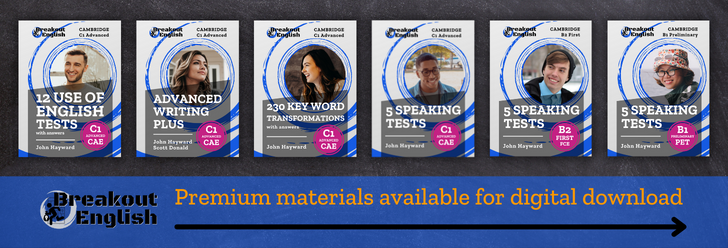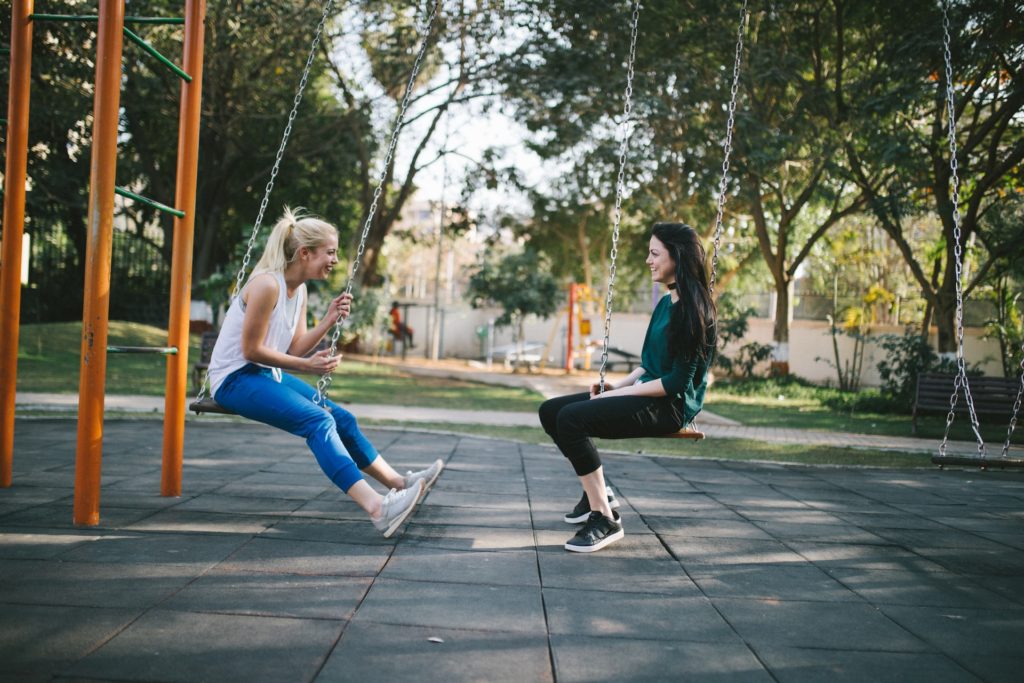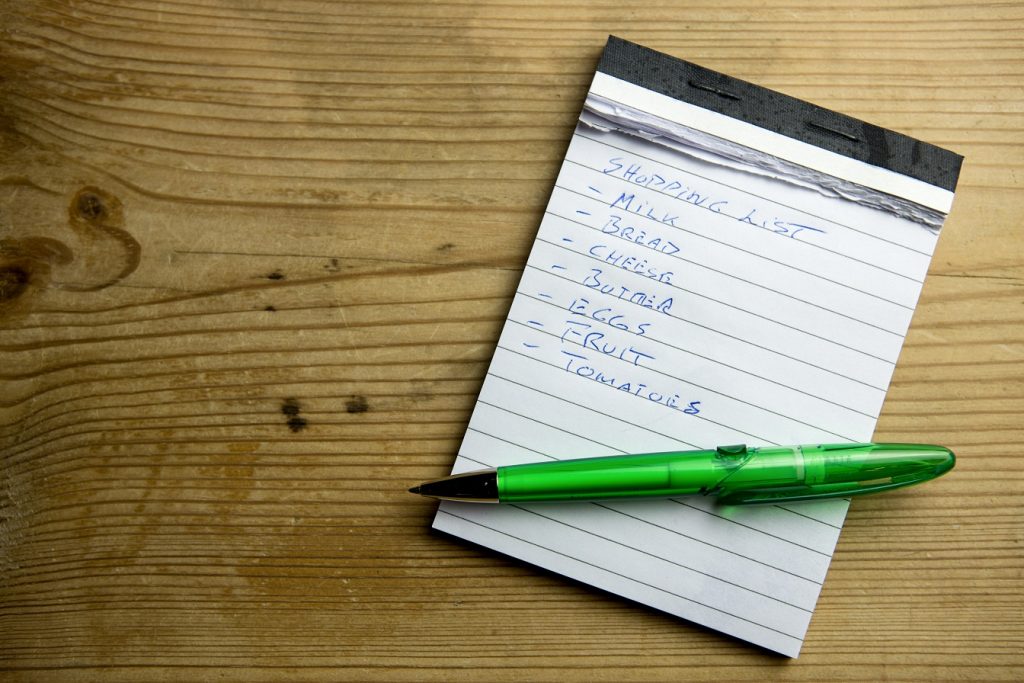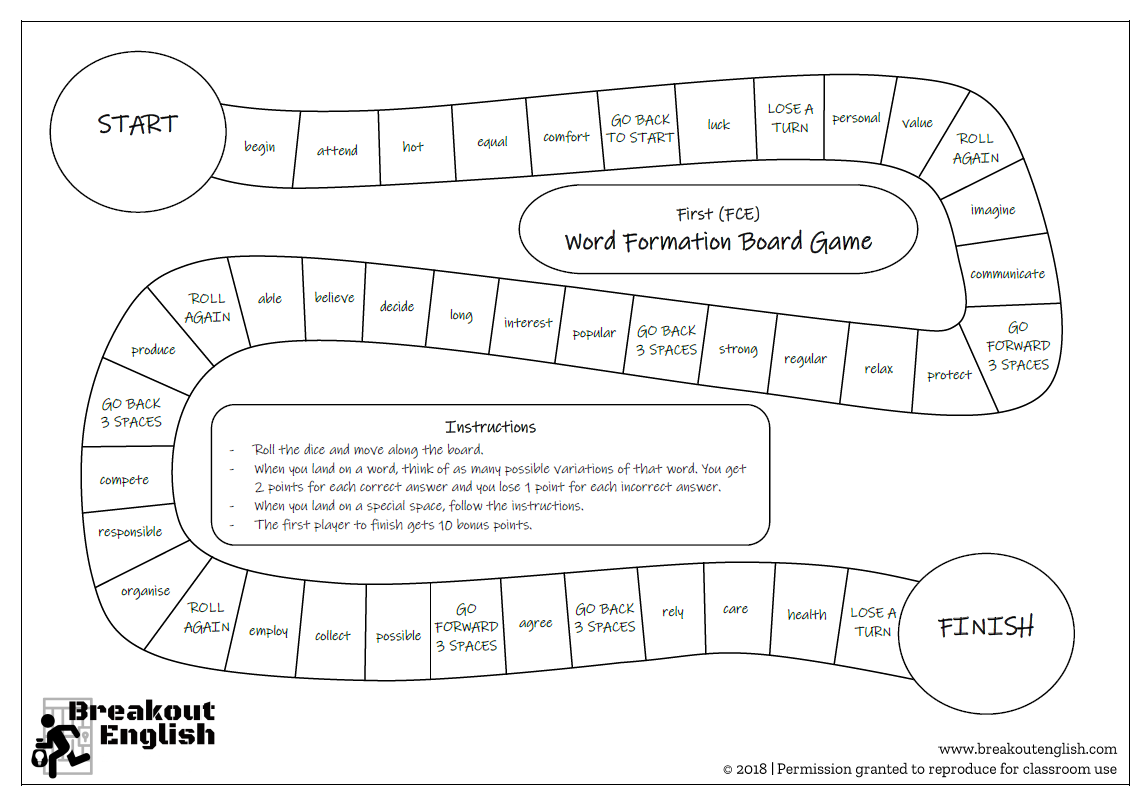Breakout English has a number of First (FCE) materials for you to use in class or at home to prepare for the Cambridge B2 exam. The Cambridge First exam is a big step up from B1 level exams. At B2, Cambridge introduces the Use of English section while also increasing the challenge of several other task types in the Reading, Writing, Listening and Speaking papers.
Materials
First (FCE) B2 Essay Structure – Essay Skeletons
Fun writing activity: The consequences game
First (FCE) B2 Key Word Transformations – Relative Clauses
Uses of punctuation marks – Writing well-structured sentences
250 First (FCE) Key Word Transformations B2
First (FCE) B2 Key Word Transformations – Comparatives and Superlatives Exercises
First (FCE) Speaking Part 3 Examples
Dependent prepositions exercises – Use of English part 2
Word Formation Exercises – Conversation Questions
How to write a report
First (FCE) Speaking Part 3 Useful Phrases
How to do First (FCE) Reading Part 6 – Gapped text
Christmas Find Someone Who – Open cloze
B2 First (FCE) Writing Part 1 – Improve an Essay
First (FCE) B2 Key Word Transformations – Phrasal Verbs
Informal vs formal letters and emails
How to write a film review
Just a Minute Topics
Gerunds and Infinitives List
Christmas Speaking Activities
The best First Certificate books
IELTS Academic Writing Part 1 – Describing change and surveys
First (FCE) Essay Questions
First (FCE) Speaking Part 2 Pictures
First (FCE) Song – Fast Car – Tracy Chapman
Christmas Songs Listening
The 120 most useful phrasal verbs list
First (FCE) B2 Key Word Transformations – Conditionals
Linking words – How to improve your writing
Writing an Article – Rhetorical Questions
First day get to know you questions
First (FCE) Speaking – Sample Tests
First (FCE) Song – Shallow – Lady Gaga, Bradley Cooper
How to do First (FCE) Use of English Part 2 “Open Cloze”
Word Formation Games
How to teach Cambridge exam classes
Wishes and Regrets
How to do First (FCE) Speaking Part 2 – Useful Phrases
Expressing Preferences – Would you rather…
Agree / Disagree Language – The Environment
Cambridge Speaking Part 1 – Chat Cards
First (FCE) B2 Key Word Transformations – Reporting Verbs Exercise
First day of exam class – Get to know the exam (Cambridge)
First (FCE) Word Formation Board Game
No post found

How to prepare for First (FCE)
In order to demonstrate a B2 level, Cambridge First (FCE) challenges candidates to produce complex language and deal with complex topics. It will be necessary to have a solid grasp of less frequent vocabulary, such as phrasal verbs, as well as a strong knowledge of the way language is linked together to form a variety of writing texts and spoken discourse.
By the time someone has passed the Cambridge B2 exam, you can be sure that they are able to communicate effectively in any everyday situation and quite possibly be able to handle more difficult or abstract topics as well. It’s a strong level, which anyone who achieves it should be considered to have better than average English.
Here are some things you can do to prepare for the exam:
- Start reading and listening to more English – You should be able to handle a lot of texts and listenings in English and practice makes perfect. It will build your vocabulary and help your pronunciation too. Try something like TED-Ed videos, which are short and thought-provoking.
- Study vocabulary – You will need to know phrasal verbs and linking words as well as dealing with topics like the environment and education. Studying vocabulary for these topics will help in all parts of the exam.
- Learn complex grammar – To show your level of English at B2 level, you want to use grammar like the passive voice, conditionals and reporting verbs well. These grammar areas will help to prove you are worthy of the level.
- Write – Writing is an important part of the exam and you will need to feel comfortable writing essays, letters/emails, articles, reviews and reports. This also means understanding the difference between formal and informal writing.
- Take a class – The First Certificate exam isn’t easy. Having a teacher and peers supporting your progress and providing motivation makes a huge difference.
- Do practice exams – You can get books of practice exams which will help you feel familiar with the format and improve your test-taking skills.
Enjoy the First (FCE) materials!
More Cambridge materials














































